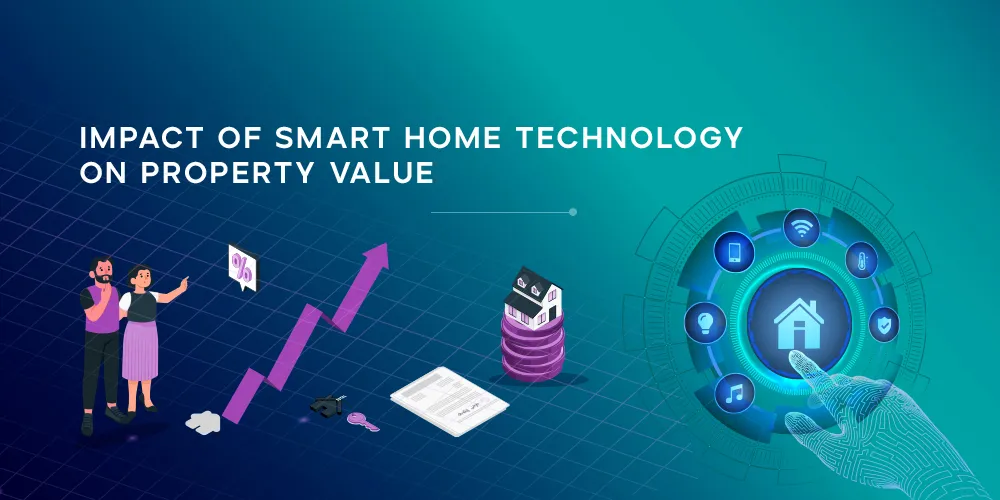In 2025, real estate buyers are no longer just looking at location, square footage, or kitchen upgrades. Today’s modern homebuyers want connected, energy-efficient, and secure living spaces. This is where smart home technology plays a huge role.
From automated lighting and security systems to smart thermostats and energy monitors, smart technology is reshaping how people view real estate. But more importantly for homeowners and investors, it can significantly increase property value and attract higher-paying buyers or renters.
In this article, we’ll explore the smart home technologies that truly matter in the housing market, the benefits they provide, the risks you should consider, and practical tips to maximize your property’s value with the right investments.
Why Smart Home Technology Matters for Property Value
1. Buyer Expectations in 2025
Modern buyers—especially Millennials and Gen Z—have grown up with technology. For them, smart features are not luxuries but necessities. Homes equipped with integrated systems have higher market appeal.
2. Energy Efficiency and Savings
Smart devices reduce waste and lower utility costs. Energy efficiency is one of the strongest selling points for buyers concerned about rising utility bills and sustainability.
3. Safety and Security
Security cameras, smart locks, and motion sensors not only protect homes but also offer peace of mind, making the property more attractive.
4. Convenience and Lifestyle
Automation makes daily life easier. Voice-activated assistants, automated blinds, and climate control appeal to those who value comfort and time savings.
5. Higher Rental Demand
For rental properties, smart technology helps landlords attract tenants willing to pay higher rents, especially in urban areas.
Top Smart Home Technologies That Increase Property Value
1. Smart Security Systems
- Examples: Video doorbells (Ring, Nest), smart locks, and motion sensors.
- Why It Adds Value: Security is a top concern for homeowners. A property equipped with a 24/7 surveillance system is seen as safer and more desirable.
- Tip: Choose devices with remote access so owners can monitor homes from anywhere.
2. Smart Thermostats
- Examples: Nest, Ecobee, Honeywell.
- Why It Adds Value: These devices learn user preferences and adjust heating and cooling for comfort while reducing energy bills.
- Market Impact: Studies show smart thermostats can save homeowners up to 10–15% annually on energy costs, which buyers love.
3. Smart Lighting Systems
- Examples: Philips Hue, LIFX, GE Cync.
- Why It Adds Value: Energy-efficient lighting with remote control, dimming, and scheduling features is both practical and stylish.
- Bonus: It also improves home ambiance, which enhances first impressions during property showings.
4. Smart Appliances
- Examples: Refrigerators, ovens, washing machines with Wi-Fi connectivity.
- Why It Adds Value: These appliances simplify chores and can self-diagnose issues, lowering maintenance costs.
- Best Strategy: Focus on high-use appliances—kitchen and laundry equipment bring the most ROI.
5. Home Automation Hubs
- Examples: Amazon Alexa, Google Home, Apple HomeKit.
- Why It Adds Value: A centralized hub allows integration of all smart devices, making the property’s technology user-friendly and future-proof.
6. Smart Irrigation Systems
- Examples: Rachio, RainMachine.
- Why It Adds Value: These systems use weather data to optimize watering schedules, saving water bills and appealing to eco-conscious buyers.
7. Smart Energy Monitoring
- Examples: Sense, Neurio.
- Why It Adds Value: These tools track household energy consumption, helping owners save money and meet sustainability goals.
8. Smart Blinds and Window Shades
- Why It Adds Value: Automated shades improve comfort, privacy, and energy efficiency by blocking or letting in sunlight.
- Bonus Appeal: Voice or app control adds a futuristic “wow factor” that impresses buyers.
9. Smart Smoke and Carbon Monoxide Detectors
- Examples: Nest Protect.
- Why It Adds Value: These detectors send alerts to smartphones and provide early warnings, boosting safety—a big selling point for families.
10. Smart Garage Door Openers
- Why It Adds Value: Adds convenience and security for homeowners with garages.
- Extra Benefit: Can integrate with delivery services to allow safe drop-offs inside garages.
How Much Value Does Smart Technology Really Add?
While the exact number varies depending on location, demand, and devices, research suggests:
- Smart home features can increase property value by 3–7%.
- Homes with full smart security systems and energy-saving devices sell faster than those without.
- Rental properties with smart features can command 5–10% higher rents in competitive markets.
Risks to Consider Before Installing Smart Tech
- Obsolescence – Technology evolves quickly; outdated systems may not hold long-term value.
- Compatibility Issues – Not all devices integrate seamlessly; fragmented systems can frustrate buyers.
- Cybersecurity Concerns – Buyers may hesitate if devices lack strong security features.
- Upfront Costs – Not all smart devices provide immediate ROI; prioritize those with clear demand.
Best Practices for Maximizing Property Value with Smart Tech
- Invest in universally appealing devices like thermostats, security, and lighting before niche gadgets.
- Choose energy-efficient and eco-friendly systems that lower long-term costs.
- Opt for widely supported platforms like Alexa, Google, or Apple for future compatibility.
- Highlight smart features in listings—emphasize cost savings, safety, and convenience.
- Maintain devices regularly so they’re functional during showings.
FAQs: Smart Home Technology and Property Value
1. Do smart homes sell faster than traditional homes?
Yes. Studies show smart-equipped homes sell faster because buyers perceive them as modern and ready-to-live-in.
2. What is the most valuable smart home upgrade?
Smart security systems and thermostats offer the best ROI since they address safety and energy savings.
3. Are smart appliances worth it?
Yes, but focus on high-use areas like the kitchen. A smart refrigerator or oven can impress buyers more than smaller gadgets.
4. Do renters care about smart home tech?
Absolutely. Tenants often pay more for convenience and security features in rental properties.
5. Can smart tech increase insurance discounts?
Yes. Some insurers offer discounts for homes with smart security or fire detection systems.
Conclusion
Smart home technology is no longer a futuristic luxury—it’s a mainstream necessity that buyers expect in 2025. From smart thermostats and lighting to advanced security systems, these innovations make homes more efficient, secure, and comfortable.
For property owners and investors, adopting smart tech isn’t just about convenience—it’s about boosting market value and staying competitive. By choosing the right systems, ensuring integration, and highlighting benefits to potential buyers or tenants, you can turn smart upgrades into tangible financial returns.


